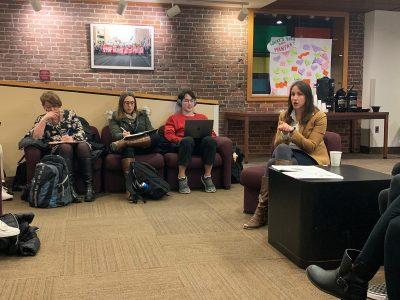Immigrants make up nearly 14 percent of the United States population, but recent legislative policy changes, such as the potential expiration of Deferred Action for Childhood Arrivals, threaten to lower the influx of international citizens. As these governmental changes take place, minority groups continue to report experiencing discrimination.

To address these conflicts, a panel entitled “Supporting our immigrant students in uncertain times,” part of the Critical Coffee and Conversations series at the Wheelock College of Education and Human Development, was held in the Pickering Educational Resources Library Monday.
Professor Eleonora Villegas-Reimers and lecturer Kaylene Stevens, both professionals in early childhood education, targeted the challenges immigrants face, specifically in the classroom. During the discussion, the two talked about the importance of providing support and resources to those newly integrating into American schools.
Stevens, who had previously worked at Framingham High School for 14 years, spoke about the trauma she witnessed in her students, which led to her to teach prospective teachers and equip them with relevant information. Stevens said training educators is vital in creating a comfortable space for all people.
“Our students were really afraid,” Stevens said in an interview. “I think that the hate speech is terrible and awful, and it’s like a symptom of a larger problem, and it exasperates the fear that the students are already feeling.”
Villegas-Reimers, said as a Latina-American and an immigrant, she was stereotyped and faced prejudices. As harassment against immigrants continues to increase, she said having this conversation is necessary.
“Children are asking difficult questions that our students don’t know how to answer,” Villegas-Reimers said. “One of the things that we are seeing is that there is an increase in the sentiment against immigrants in this country and particularly anti-Muslim.”
Along with the open dialogue between faculty and students in attendance, Stevens passed around packets, labelled “Know Your Rights,” containing information on how undocumented immigrants could best respond to government officials and police.
After supplying attendees with legal information and procedures, Stevens said there is a serious need to combat injustice, primarily through emotional support.
“You have your own personal reactions to political events or social events that you’re trying to process in the moment and you have to be strong for these students,” Stevens said during the panel. “I just think that it’s most important, critical piece is letting the students know that they are safe.”
Irina Nanagoulian, an academic success specialist at Wheelock, wrote in an email that she attended the event in order to participate in a platform promoting equality and access in education.
“I believe that events like these provide invaluable opportunities for students, faculty and staff to share experiences and ideas and to capitalize on learning opportunities outside of the classroom,” Nanagoulian wrote. “Additionally, these events bring a read life edge, so to speak, to the learning — focusing on relevant issues in both policy and pedagogically informed ways.”
To adhere to the conversation’s mission of arming prospective young educators with facts, Villegas-Reimers shared statistics concerning immigrants, specifically in the state of Massachusetts to stress the prevalence and relevance of this conversation.
Almost one in six of Massachusetts citizens are immigrants, with about 6,000 being DACA beneficiaries, according to the American Immigration Council.
After Stevens and Villegas-Reimers introduced issues with immigrant discrimination and escalated social tensions in schools across the nation, students at Wheelock raised questions on the difficulties they’ve faced as student teachers.
Stephanie Osborne, who student teaches at Framingham High School, said absenteeism and a general anxiety around being deported while in school has pervaded her school district. Seeking guidance in combating these fears, Osborne said she hoped the conversation would provide insight in educating English-language learners.
“I think working with trauma is very difficult,” Osborne said after the event. “I feel like showing that you care and just talking to them has been really helpful.”
When students feel upset or worried that their undocumented status will endanger their existence, Villegas-Reimers said it is important to sympathize with them and to become makeshift caregivers.
“One of the things that we teach student teachers is to always communicate to kids, ‘You are safe in the classroom, we are going to take care of you,’” Villegas-Reimers said. “We’re thinking more of the role of our students as supporters of the immigrant students.”























































































































